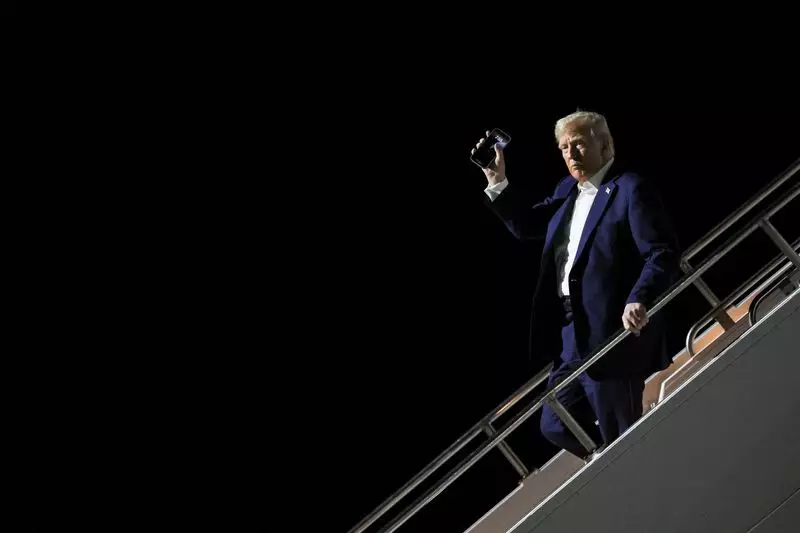As President Donald Trump resumes his tenure, the initial week has been marked by a whirlwind of activity aimed at reshaping the financial landscape of the United States. His visit to Las Vegas concludes a busy series of engagements that focus on key policies, particularly regarding tax reform. Trump’s return as a Republican leader is characterized by the ambitious promise to eradicate taxes on tips—a move designed to resonate with service workers crucial to Nevada’s economy. This initiative not only aims to rally support for his upcoming 2024 presidential campaign but also highlights his strategic focus on the hospitality sector, which contributes significantly to the state’s employment figures.
Revisiting Economic Strategies
Since taking office on a Monday filled with impactful speeches, Trump has swiftly overturned multiple initiatives set forth by the Biden administration. Among these reversals, a notable aspect is his commitment to streamline and minimize the federal bureaucracy, with sweeping proclamations hinting at future changes in governmental operations. Such actions, reminiscent of the earlier days of his presidency, signify Trump’s intention to align his administration’s policies with traditional Republican values, prioritizing tax reduction and economic incentivization over regulatory oversight.
During his time in North Carolina and California, where disaster recovery efforts are urgently needed following hurricanes and wildfires, Trump pledged federal support to aid recovery initiatives. This humanitarian stance, however, raises questions about the future of the Federal Emergency Management Agency (FEMA) itself, as Trump previously suggested possibly dissolving such institutions. These conversations reflect a dichotomy between immediate financial relief and long-term fiscal responsibility, emphasizing the complexities of governance in a crisis-prone environment.
Central to Trump’s agenda is the proposed elimination of taxes on tips and overtime wages, a pledge he originally floated during his campaign. Such a stance has resonated with many in Nevada, where service industry workers often rely on tips as a substantial source of income. The Nevada Republican Party’s chairman, Michael McDonald, has articulated the grassroots appeal of this proposal, especially amid rising living costs. Amid these discussions, the Trump administration is simultaneously contemplating a significant revision of the tax code, which could potentially add trillions to the national debt, a reality that cannot be overlooked.
The implications of Trump’s tax reduction proposals, which span a wide array of expenses—including Social Security benefits—could amount to a staggering $7.5 trillion over the next decade, according to analyses from the Committee for a Responsible Federal Budget. Such figures paint a worrying picture of fiscal sustainability, especially as they coincide with ongoing concerns regarding U.S. government debt, which currently sits at an alarming $36 trillion and is growing rapidly. This sets the stage for potential conflicts within the Republican Party, as established members express apprehensions about uncontrolled deficit spending and its consequences on the economy.
Trump’s insistence on funding tax cuts through increased tariffs on imports introduces a layer of economic complexity that could complicate his agenda moving forward. Historically, reliance on tariffs poses a concern, as fluctuations in global trade dynamics may affect revenue projections. This proposal faces scrutiny from conservative policymakers wary of undermining economic stability in favor of short-term gain. Such discussions underscore the fragile balance Trump must strike between his fiscally conservative base and his broader economic stratagem.
Amid these developments, some Republican allies have voiced their unease, suggesting that prevailing apprehensions in the bond market could stifle Trump’s fiscal ambitions. Debates surrounding the viability of extending the 2017 tax cuts further signify a pervasive division among Republicans, questioning whether these tax strategies are sustainable given the burgeoning national debt.
Trump’s reopening of his presidential campaign with promises of tax reductions alongside an aggressive reconfiguration of federal policies presents a contentious crossroads for U.S. governance. As he navigates these waters, the implications of fiscal decision-making extend far beyond the immediate political landscape, grappling with the lasting impact on American economic health and prosperity. The coming months are poised to reveal pivotal moments that will shape not only Trump’s political destiny but also that of the nation as a whole.

